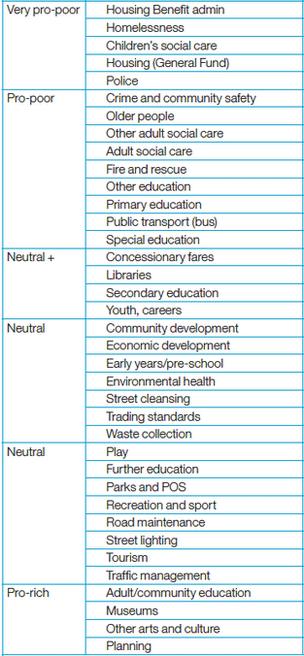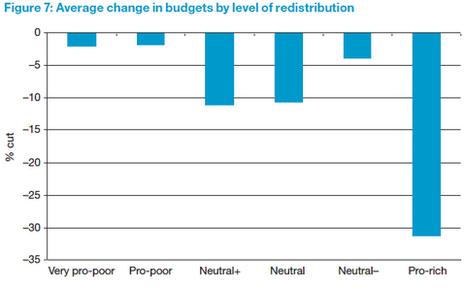Blunt speaking on town hall cuts
- Published
- comments

Councils still make a point of finding money to fix potholes
"Stop believing what the government tells you" - advice from one senior executive in a Conservative-controlled council in England on local government cuts.
"This is the most unfair and unjust settlement I have ever seen, and the sooner it is seen off the better," said another, also working for a Tory authority.
The Joseph Rowntree Foundation (JRF) on Thursday publishes details of some of the telephone conversations they have had with top officials in English councils in a report on the impact of reductions to local government budgets, external for the most deprived communities.
For those of a delicate disposition, a warning: the next response contains some blunt vernacular.

"All the stuff that the government said was a complete nonsense," a senior officer in a Tory-run authority told them.
"They've made up this new formula - which is to say that our complete income-generating power, including council tax receipts, is X. Bollocks. It's a lot harder than he [Local Government Secretary Eric Pickles] would like to make out."
Twenty-five local authority chief executives or senior officials were interviewed in what the report describes as a broadly representative sample of English councils. The researchers, perhaps expecting that officials in Tory areas would be more supportive of Conservative ministers in Westminster, express surprise at the unanimity of response.
It is suggestive, they conclude, "of the widespread shock across the sector, regardless of the political affiliation of the authority".
The government argues that the cuts to local authority budgets are necessary to deal with the deficit and that only by obliging councils to take a long hard look at their efficiency and their spending priorities can the country avoid a much worse economic plight.
Ministers argue that while they have "offered a higher degree of protection to the vulnerable", some council chief executives "earn £100,000 more than the prime minister".
The JRF research, however, looks at what is happening on the ground and warns that "a particularly severe real terms cut" in council budgets will hit the most deprived authorities hardest.
"The consequences for vulnerable people and places living in the most disadvantaged council areas may be substantial," they suggest.
Analysing previously published research evidence, the report aims to assess how the cuts are affecting services used disproportionately by people from different income groups. This table shows the range of provision from "very pro-poor" help for the homeless to "pro-rich" funding for museums, arts and culture.
What emerges is a progressive picture of much bigger cuts to "pro-rich" services than "pro-poor", although the category described as "neutral-" appears to have been somewhat protected.

In this group one finds road maintenance and traffic management - it would appear that councils are reluctant to hit the motorist too hard.
In one authority, councillors agreed that "fixing pot holes" was the only issue for which they were prepared to dip into their reserves after a local consultation identified it as residents' top priority.
"Elected members have their voters to appease," the JRF researchers note in their report, adding that "the ability of the so-called 'sharp-elbowed middle classes' to defend or claim back the services they consider they need or deserve should not be underestimated."
Despite the fact that pro-poor services seem to have been affected least, the evidence is that, because poorer communities are more reliant on council services, the impact of cuts will fall more heavily on disadvantaged people. More affluent households, it is argued in today's report, have "the capacity to supplement public with other forms of provision".
This observation goes to the heart of the argument about what "fair" should mean.
Is it fairer that cuts are made across the board, regardless of wealth? Or does fairness imply that the council should protect those in most need, prioritising the poorest neighbourhoods ahead of the more affluent?
Today's report claims to have found "evidence of tensions emerging around the degree to which the needs of disadvantaged groups should be protected and prioritised".
A telephone interview with one executive in a Conservative-controlled council reveals some of the difficulties in being seen to safeguard the poorest citizens.
Researcher: "What about the situation for deprived neighbourhoods? Have they taken a bigger hit?"
Senior executive: "Not intentionally, we have tried not to..."
Researcher: "Was there discussion of that principle?"
Senior executive: "Yes."
Researcher: "Where was it discussed? In cabinet?"
Senior executive: "I don't think we've got that recorded anywhere... Where we can, we are consciously protecting the deprived communities and their voluntary sector, but we're not being spectacularly overt about it, we're just doing it."
The JRF report suggests that, although deprived neighbourhoods will take the biggest hit, councils are quietly trying to target their provision towards the most needy. However, this strategy has potentially negative consequences of its own.
"It could mean that, for example, the adult social care provided by local government becomes stigmatised and residualised," the researchers warn. The client base becomes over-represented by the most severe and complex cases from the poorest communities, removing from the process the "well connected, demanding advocates of good service".
For those who worry that some disadvantaged neighbourhoods are being cast adrift from mainstream society, today's JRF report makes troubling reading. It questions whether English local government can continue to serve deprived communities and suggests the "early evidence points to the distinctive impact of cuts on services for children and young people".
Eric Pickles has consistently argued that it is by bearing down on waste and duplication that local authorities can find the necessary savings without damaging front-line services. It is not a view shared by the Joseph Rowntree Foundation.
"That the 'next generation' are the most obvious casualty of the current remaking of local government provides considerable cause for concern," the researchers conclude.